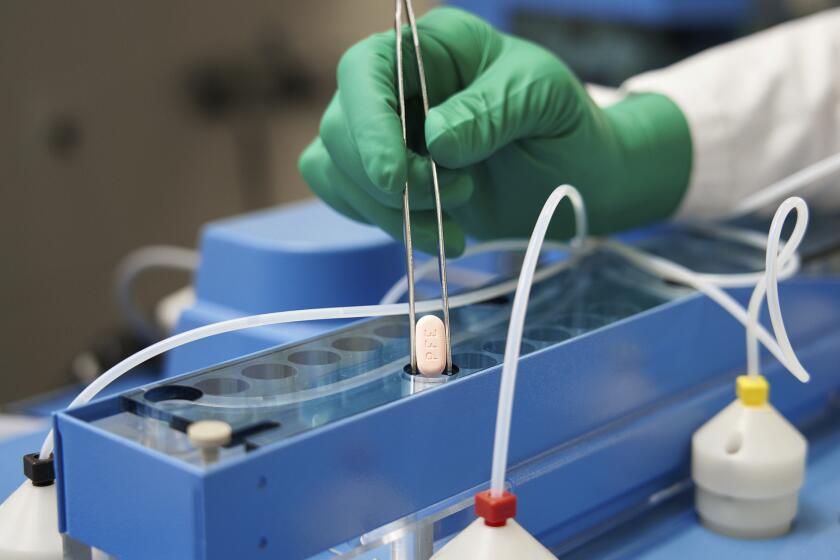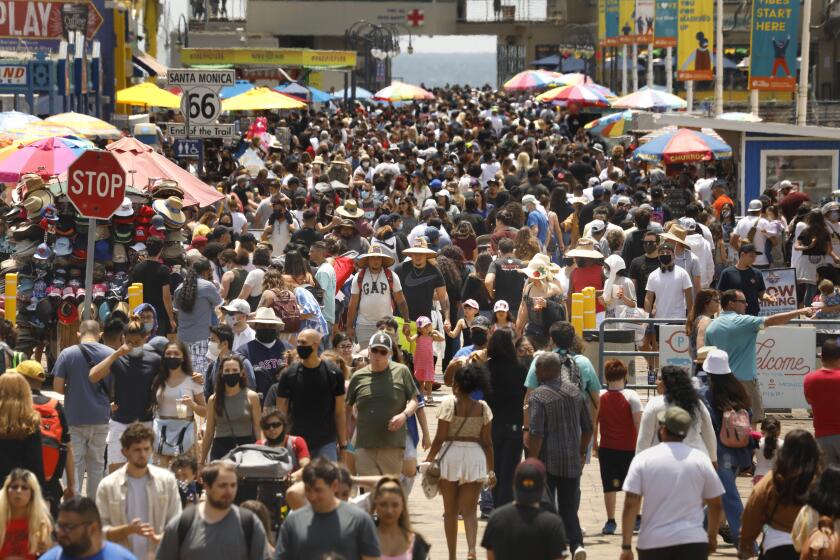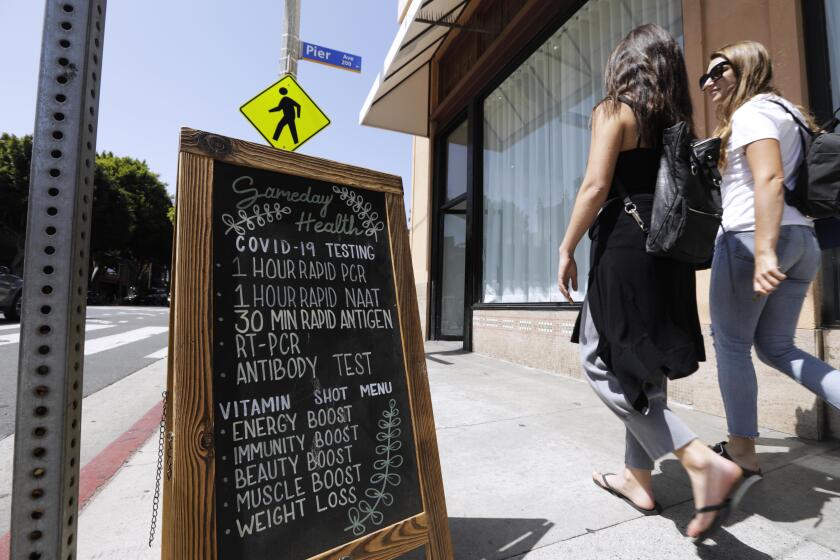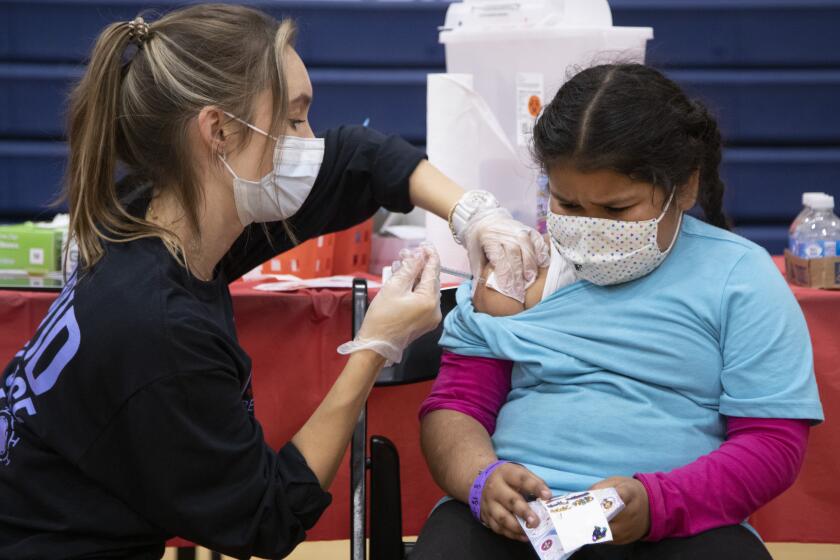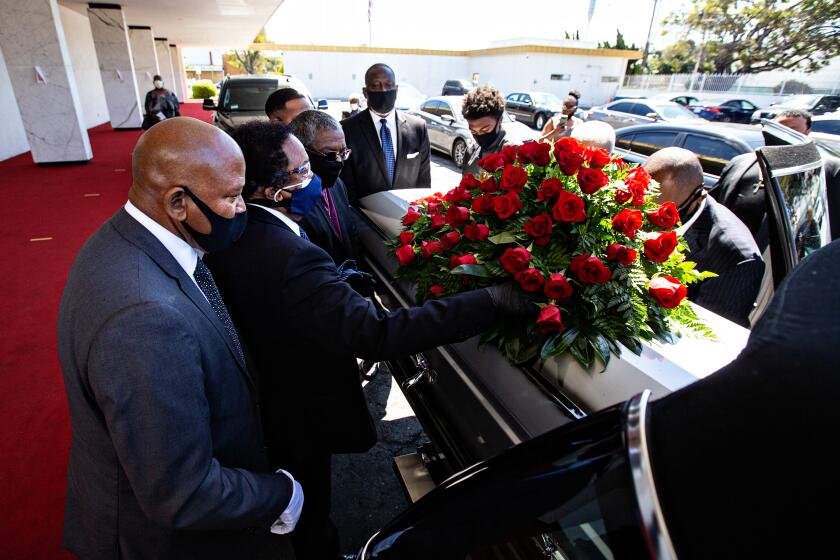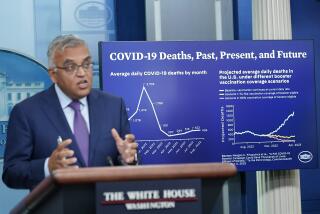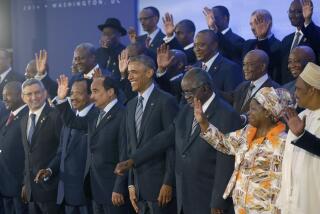Biden to co-host second global COVID summit as U.S. nears 1 million deaths

President Biden appealed to world leaders on Thursday for a renewed international commitment to attacking COVID-19 as he led the U.S. in marking the approaching “tragic milestone” of 1 million deaths at home from the coronavirus.
- Share via
WASHINGTON — President Biden will appeal for a renewed international commitment to attacking COVID-19 as he convenes a second virtual summit on the pandemic.
The president is also expected to mark 1 million COVID-19 deaths in the United States. The disease has killed about 990,000 Americans so far, according to researchers at Johns Hopkins University.
“As a nation, we must not grow numb to such sorrow,” Biden said in a statement. “To heal, we must remember. We must remain vigilant against this pandemic and do everything we can to save as many lives as possible.”
He called on Congress to provide more funding for testing, vaccines and treatments, something lawmakers have been unwilling to deliver so far.
The lack of funding — Biden has requested an additional $22.5 billion of what he says is critically needed money — reflects a faltering resolve at home that could jeopardize the ongoing global response to the pandemic.
Eight months after he used the first such summit to announce an ambitious pledge to donate 1.2 billion vaccine doses to the world, the urgency felt in the U.S. and other nations to respond has waned.
In Los Angeles and elsewhere, health workers are unable to see how many doses of Pfizer’s antiviral treatment are reaching the most vulnerable.
Momentum on vaccinations and treatments has faded even as more infectious variants rise and billions of people across the globe remain unprotected.
The White House said Biden would address the opening of the virtual summit Thursday morning with pre-recorded remarks and would make the case that addressing COVID-19 “must remain an international priority.” The U.S. is co-hosting the summit with Germany, Indonesia, Senegal and Belize.
The U.S. has shipped nearly 540 million vaccine doses to more than 110 countries and territories, according to the State Department — by far more than any other donor nation.
After the delivery of more than 1 billion vaccines to the developing world, the problem is no longer that there aren’t enough shots but a lack of logistical support to get doses into arms. According to government data, more than 680 million donated vaccine doses have been left unused in developing countries because they were set to expire soon and couldn’t be administered quickly enough.
Health officials are urging precautions, including masking, as transmission levels tick up across the state.
As of March, 32 poorer countries had used fewer than half of the COVID-19 vaccines they were sent.
U.S. assistance to promote and facilitate vaccinations overseas dried up earlier this year, and Biden has requested about $5 billion for the effort through the rest of the year.
“We have tens of millions of unclaimed doses because countries lack the resources to build out their cold chains, which basically is the refrigeration systems; to fight disinformation; and to hire vaccinators,” White House Press Secretary Jen Psaki said this week. She added that the summit would be “an opportunity to elevate the fact that we need additional funding to continue to be a part of this effort around the world.”
“We’re going to continue to fight for more funding here,” Psaki said. “But we will continue to press other countries to do more to help the world make progress as well.”
The alleged scheme capitalized on federal laws that were meant to smooth the way for people to get tested without fretting about the bill, according to complaints filed by L.A. authorities.
Congress has balked at the price tag for COVID-19 relief and has thus far refused to take up the package because of political opposition to the impending end of pandemic-era migration restrictions at the U.S.-Mexico border. Even after a consensus for coronavirus funding briefly emerged in March, lawmakers decided to strip out the global aid funding and focus the assistance solely on shoring up U.S. supplies of vaccine booster shots and therapeutics.
Biden has warned that, without action from Congress, the U.S. could lose out on access to the next generation of vaccines and treatments and that the nation won’t have enough supply of booster doses or the antiviral drug Paxlovid for later this year. He’s also sounding the alarm that more variants will spring up if the U.S. and the world don’t do more to contain the coronavirus globally.
“To beat the pandemic here, we need to beat it everywhere,” Biden said last September during the first global summit.
COVID-19 has killed at least 6.2 million people globally, according to figures from the World Health Organization.
Breaking News
Get breaking news, investigations, analysis and more signature journalism from the Los Angeles Times in your inbox.
You may occasionally receive promotional content from the Los Angeles Times.
Demand for COVID-19 vaccines has dropped in some countries as infections and deaths have declined globally in recent months, particularly as the Omicron variant has proved to be less severe than earlier versions. For the first time since it was created, the United Nations-backed vaccine consortium COVAX effort has “enough supply to enable countries to meet their national vaccination targets,” according to vaccines alliance GAVI CEO Dr. Seth Berkley, which fronts COVAX.
Still, despite more than 65% of the world’s population receiving at least one COVID-19 vaccine dose, fewer than 16% of people in poor countries have been immunized. It is highly unlikely that countries will hit the World Health Organization’s target of inoculating 70% of all people by June.
In countries such as Cameroon, Uganda and the Ivory Coast, officials have struggled to get enough refrigerators to transport vaccines, send enough syringes for mass campaigns and get enough health workers to inject the shots. Experts also point out that more than half of the health workers needed to administer the vaccines in poorer countries are either underpaid or not paid at all.
Donating more vaccines, critics say, would miss the point entirely.
The postponement of the COVID-19 student mandate is related to high vaccine rate among older students and few transmissions in schools, officials say.
“It’s like donating a bunch of fire trucks to countries that are on fire, but they have no water,” said Ritu Sharma, a vice president at the charity CARE, which has helped immunize people in more than 30 countries, including India, South Sudan and Bangladesh.
“We can’t be giving countries all these vaccines but no way to use them,” she said, adding that the same infrastructure that got the shots administered in the U.S. is now needed elsewhere. “We had to tackle this problem in the U.S., so why are we not now using that knowledge to get vaccines into the people who need them most?”
Sharma said greater investment was needed to counter vaccine hesitancy in developing countries where there are entrenched beliefs about the potential dangers of Western-made medicines.
“Leaders must agree to pursue a coherent strategy to end the pandemic instead of a fragmented approach that will extend the lifespan of this crisis,” said Gayle Smith, CEO of the ONE Campaign.
No state has suffered more pandemic-related deaths than California. However, on a per capita basis, California has the 11th-lowest COVID-19 death rate.
GAVI’s Berkley also said that countries are increasingly asking for the pricier messenger RNA vaccines made by Pfizer and Moderna, which are not as easily available as the AstraZeneca vaccine, which made up the bulk of COVAX’s supply last year.
The emergence of variants like Delta and Omicron have led many countries to switch to mRNA vaccines, which seem to provide more protection and are in greater demand globally than traditionally made vaccines like AstraZeneca, Novavax or those made by China and Russia.
More to Read
Sign up for Essential California
The most important California stories and recommendations in your inbox every morning.
You may occasionally receive promotional content from the Los Angeles Times.
